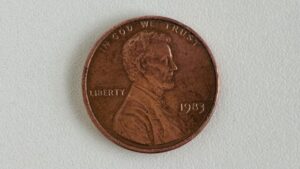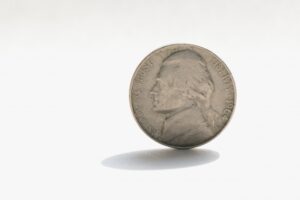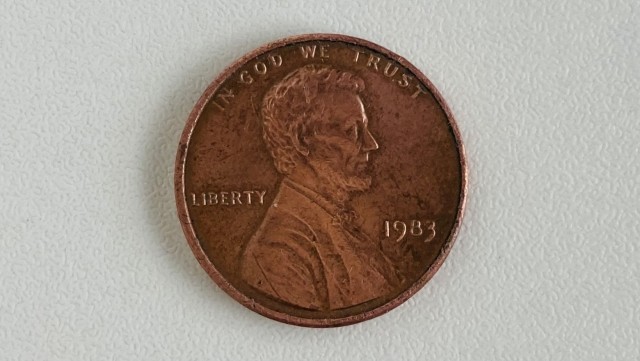青森県公立高校入試分析(英語)の2回目です。
今回は、第2問を扱いますが、
第2問では、「並べ替え、英問に対する規定語数以上の答え」を求める問題です。
それでは第2問を見て行きます。
第2問の配点は、
( 1 )は各2点✖️3=計6点
( 2 )が2点
(3)は各3点✖️2=計6点 なので、合計14点となっています。
第2問・・・対話文からの問題
次の英文は、ケンタ( Kenta ) と、アメリカ人留学生のビル ( Bill ) の対話の一部です。2人は、アメリカ合衆国の通貨を見ながら話をしています。これを読んで、あとの(1)~(3)に答えなさい。※印の語句には、対話のあとに(注)があります。(14点)
Kenta:Hi, Bill.
Bill:Hi, Kenta. ア ( will interesting show I you ) things. Look at three
ー *coins. I brought them from my country.
【アメリカ合衆国の硬貨】

one-cent coin ( 1セント硬貨)

five-cent coin (5セント硬貨)
Kenta:Oh, these two coins have a person’s face on them.
Bill:You’re right.
Kenta:イ ( are whose on designed faces ) the coins?
Bill:Well, for example, the one-cent coin has the face of *Abraham Lincoln on it.
Kenta:Oh, Abraham Lincoln. I know his name.
Bill: This coin is called a *penny. Penny is another name of the one-cent coin.
Kenta:I see. Does the other coin have another name, too?
Bill:Yes, it does. It is a five-cent coin. It is called a *nickel.
Kenta:Interesting! Some coins have other names. I didn’t know that.
Bill:Do you have other names for Japanese coins?
Kenta:No, we don’t have them, but Japanese coins have interesting
ー*characteristics. We have six【 】of coins today. Two of them have a
ー hole in them. Did you know that?
Bill:Yes, I did. I was surprised when I saw them *for the first time. I can
ー*distinguish the coins easily by the hole. It’s very useful.
Kenta:Do you think so? ウ ( have you I could wish ) a useful hole in
ー your country’s coins. Now, I’m interested in the coins of your country. I will
ー look at a website about them. If I have questions. I will send you an e-mail
Bill:Yes, please.
(注)
coin(s) 硬貨 Abraham Lincoln エイブラハム・リンカン(アメリカ合衆国第16代大統領)
penny ペニー(硬貨の通称) nickel ニッケル(硬貨の通称)
characteristic(s) 特徴 for the first time 初めて distinguish 〜を見分ける
(1)並べかえ問題
下線部ア 〜ウについて、文の意味が通るように、( )内の語句をすべて用いて、
正しい順序に並べかえて書きなさい。大文字にする必要のある文字は大文字にしなさい。
アの並べ替え
ア ( will interesting show I you ) things.
【解説】
・ピリオドがあることから、「肯定文」であることがわかります。
▶︎並べ替えの単語を見ると…主語になれるのは ” I ” だけのようです。
▶︎助動詞 が will、動詞が show となるので … I will show までは確定です。
▶︎ show という動詞は、
「show+人+もの」の形で、「人」に「もの」を見せる、という意味になります。
【解答】
・ここから、
ア ( I will show you interesting ) things. となります。
[私はあなたに面白い(ものを) 見せましょう。]
イの並べ替え
イ ( are whose on designed faces ) the coins?
【解説】
・最後にクエスチョンマークがついているので、「疑問文」です。
・wh疑問詞の whose があるので、おそらく whose faces が文頭にきます。
▶︎ designed は、design の過去形(あるいは過去分詞)で
be動詞 (are) もあることから、受動態で
– are designed で「デザインされている」という意味になることが予想されます。
▶︎ on は、on the coins で「コインに」というひとかたまりになりそうです。
【解答】
ここから、
イ ( Whose faces are designed on ) the coins? となります。
[誰の顔が、(そのコイン)にデザインされていますか。]
※ whose faces が主語なので、この語順になります。
ウの並べ替え
ウ ( have you I could wish ) a useful hole in your country’s coins.
【解説】
・並び替えの単語を見ると
▶︎ I wish +主語+ could 〜 . の形で
「あなたが〜ができたらいいのになあ」のように意味になるようです。
※「仮定法」の表現です。
【解答】
ここから、
ウ ( I wish you could have ) a useful hole in your country’s coins.
となります。
[私は (あなたの国のコインに便利な穴が) あればいいのになあ、と思います。]
(2)【 】に入る語
【 】に入る最も適切な英語1語を書きなさい。
※ We have six【 】of coins today.
【解説】
・対話の流れからすると
Bill:日本の硬貨には別の名前(別名)がありますか。
Kenta:日本の硬貨には別名がありませんが、面白い特徴があります。現在日本には
ー 6【 】の硬貨があります。そのうち2つには穴があるのです。
▶︎ここから、
six【 】of coins で「6種類の硬貨」という意味になるようです。
【解答】
・kinds
※ We have six kinds of coins.
※ここでは kind は「種類」という名詞。複数形になっている所にも注意。
(3)英作文
次の文章は、ビルと話をした日の夜に、ケンタがビルに送ったメールの内容です。
下線部1、2をそれぞれ一つの英文で書きなさい。
Hi, Bill. Thank you for talking with me today. I found some words on the two
coins. I don’t think that some of them are English. 1 私はその言語が何かを知りた
いです。 Do you know that? I also found a nice building on the five-cent coin.
I looked at the website about it and I was surprised that it was a part of a
World Heritage Site. 2 世界には訪れるべき建物がたくさんあります。 I think that
this building is one of them.
【解説】
・前後の英文も参考にしながら、「1」と「2」の日本文を英語にする問題です。
○「1」の日本文「私はその言語が何かを知りたいです。」
▶︎「私は〜を知りたいです。」と英文を作りましょう。
・「〜したい」という表現なので、want to +動詞の原形を用いて
→ I want to know 〜. の形になります。
・「〜」の部分に「その言語が何かを」という文(節)を入れます。
→そのままだと – What is the language? [ What is this? と同じ形 ] ですが、
I want to know の後ろに入るので、間接疑問文になり、”what the language is”
となります。
【解答】
ここから、正解は
I want to know what the language is. となります。
○「2」の日本文「世界には訪れるべき建物がたくさんあります。」
▶︎「〜あります。」という英文を作りましょう。
・「〜がある」という形なので、 There is / are 〜. を用いて
→ There are a lot of (many) buildings 〜. となります。
・どんな建物かというと、「訪れるべき」とあるので、
→不定詞を用いて、to visit。そして文末に in the world を加えるといいようです。
【解答】
ここからは
There are a lot of (many) buildings to visit in the world. となります。
今回はここまで。



コメント